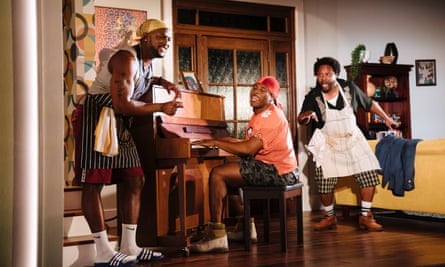A group of Black American men have convened to compete for the trophy in a hot wing (or rather “hot wang”) cooking competition in Memphis, Tennessee. Cordell (Kadiff Kirwan) is the chef, albeit out of work, having left a marriage to move in with his partner, Dwayne (Simon-Anthony Rhoden). Their friends, barber Big Charles (Jason Barnett) and super-camp Isom (Olisa Odele), float around the couple’s story.
It is rare to see a group of gay Black men on stage, as tight as family, expressing their sexuality freely and passionately. Katori Hall’s play, which won a Pulitzer prize in 2021, deals delicately in intersectional issues of race, masculinity, homophobia and fatherhood, leading with humour, Black joy and relationship drama – in that order.
The first act is a baggy affair as a result. There is fun, warmth, banter and basketball in what feels like a preparation for the drama, with swerves and tonal switches, from introducing new characters that seem marginal but become important, to bursts of song and dance.
These turns reflect the mess of real-life relationships, and director Roy Alexander Weise, who staged Hall’s The Mountaintop in 2021, navigates them well, with wonderfully choreographed cooking scenes. The food’s description (parmesan wings, spicy Cajun Alfredo wings with bourbon-infused bacon crumble, and on) made my mouth water – even as a vegetarian.

But the various parts too transparently serve their purpose – the basketball hoop a way to give the play its breathing space, the cooking bringing characters back together. When the arguments finally come they feel real and pained, bringing this play to life as it enters into Cordell’s backstory, balanced against the emotions of Dwayne’s, which involves a mentally ill sister who has died at the hands of the police.
This far more unifying second act grabs you with spicy intrigue around the competition and emotional reckonings between the central lovers as well as Dwayne’s nephew, Everett (Kaireece Denton), and his father (Dwayne Walcott), whose story rises to the fore.
The live singing in the second act is well incorporated but the mood music in the backdrop to emotional scenes is icky in its sentimentality. Rajha Shakiry’s set comprises breakfast bars and a sink counter, but with a living room at the back and a view of the bedroom upstairs, which gives the play its emotional layers.
Hall makes these men seem instantly familiar and likable. You almost want to cheer as they make their entrances, much like a live TV sitcom crowd. Even more remarkable is that the repeated delivery of the N-word, and its reclaimed meaning, is unshocking.
The humour is not quite serrated enough, the laughs comfortable, although many of the one-liners in the first act were missed by me because of the broad accents or speed of delivery. Every performance is full-bodied nonetheless, and you believe in these men. It is as if Hall seeks to send us away feeling the characters’ joy more than their pain, with the play’s warmly comic beats and its neatly rounded, wishful-thinking ending.